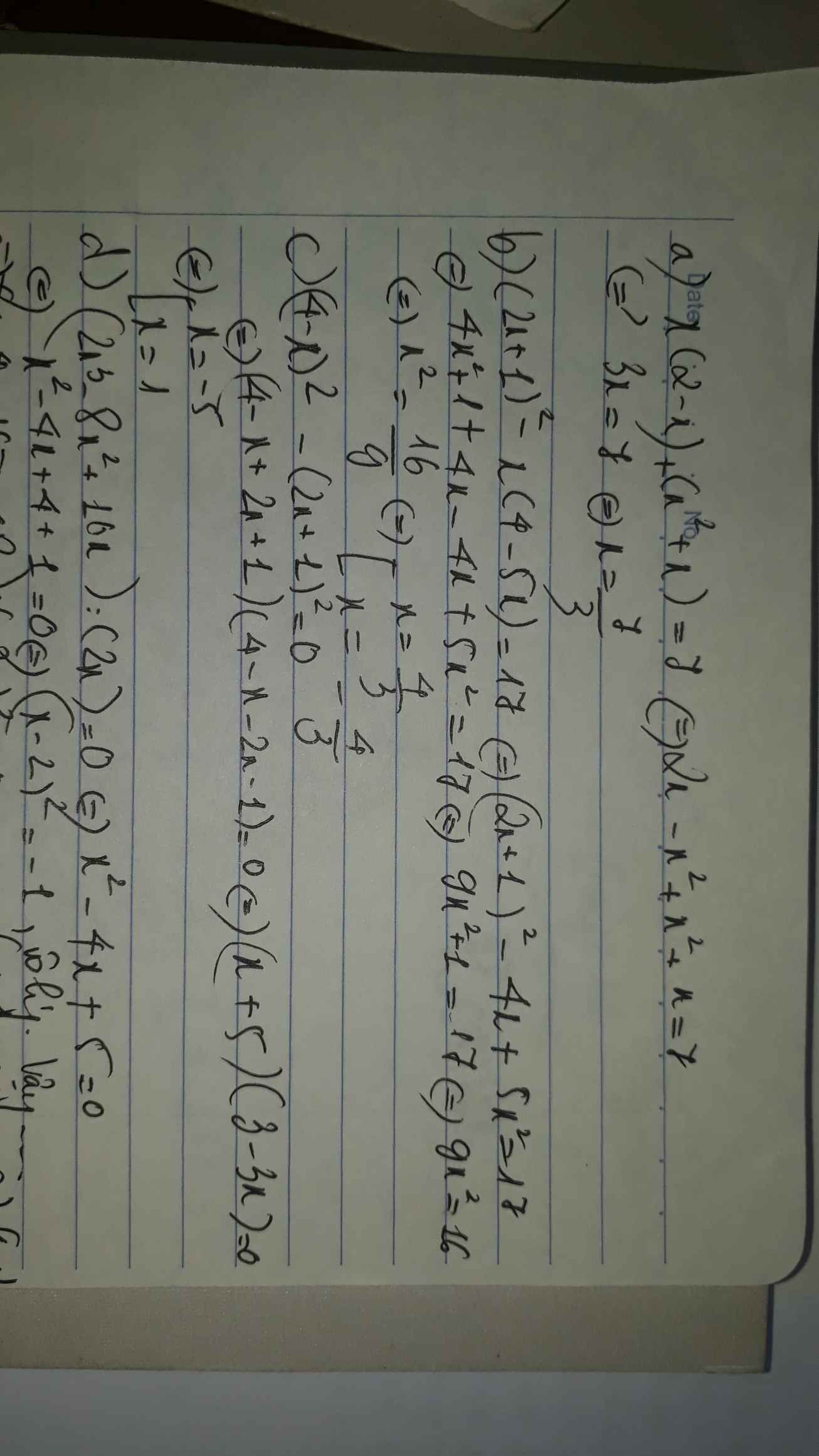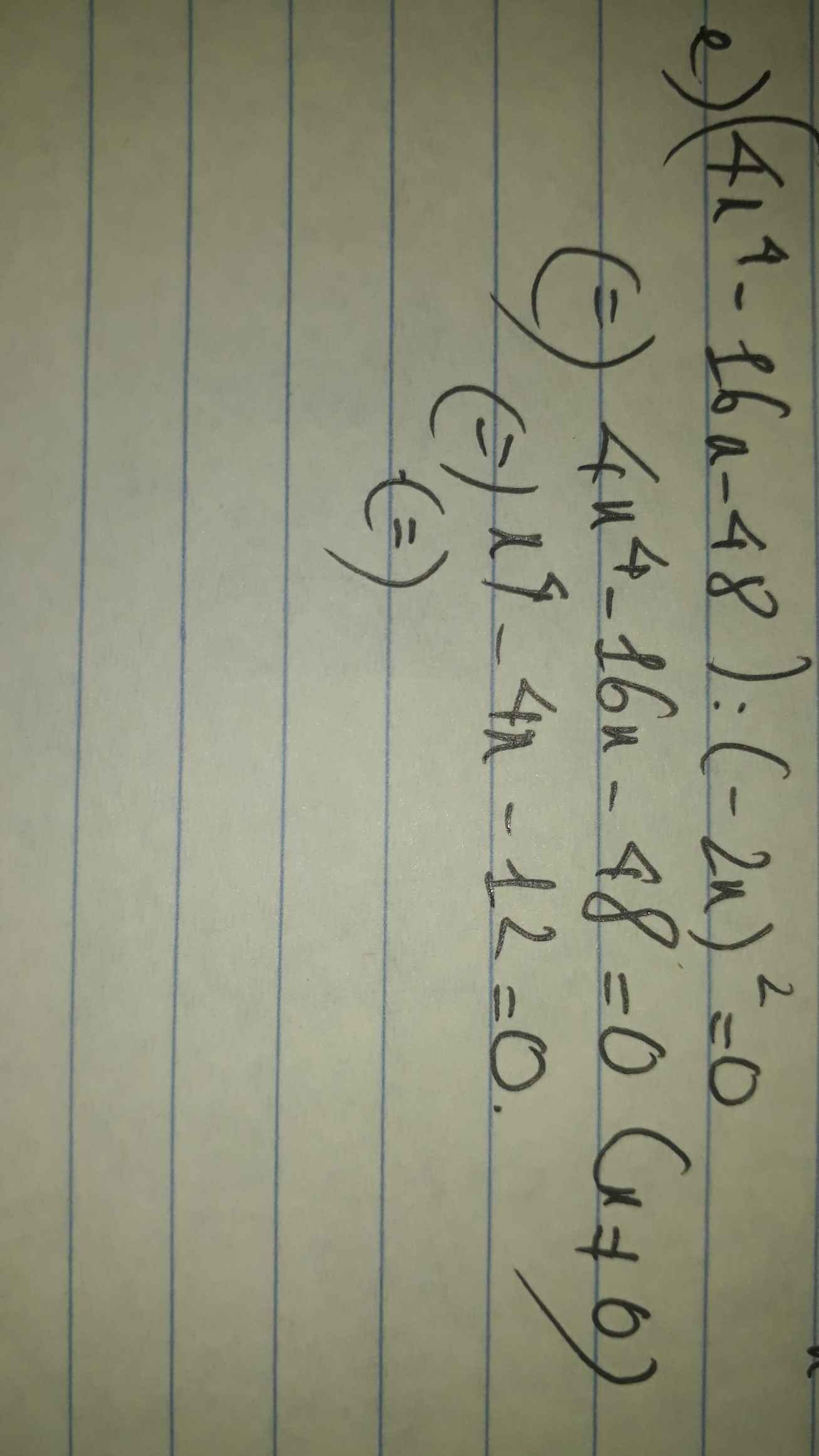x + 2\(\sqrt{2}\)x2 + 2x3 = 0

Những câu hỏi liên quan
a) (2x +1)(3 – x)(4 - 2x) = 0 b)2x(x – 3) + 5(x – 3) = 0
c) (x2 – 4) – (x – 2)(3 – 2x) = 0 d) x2 – 5x + 6 = 0
e) (2x + 5)2 = (x + 2)2 f) 2x3 + 6x2 = x2 + 3x
a: (2x+1)(3-x)(4-2x)=0
=>(2x+1)(x-3)(x-2)=0
hay \(x\in\left\{-\dfrac{1}{2};3;2\right\}\)
b: 2x(x-3)+5(x-3)=0
=>(x-3)(2x+5)=0
=>x=3 hoặc x=-5/2
c: =>(x-2)(x+2)+(x-2)(2x-3)=0
=>(x-2)(x+2+2x-3)=0
=>(x-2)(3x-1)=0
=>x=2 hoặc x=1/3
d: =>(x-2)(x-3)=0
=>x=2 hoặc x=3
e: =>(2x+5+x+2)(2x+5-x-2)=0
=>(3x+7)(x+3)=0
=>x=-7/3 hoặc x=-3
f: \(\Leftrightarrow2x^3+5x^2-3x=0\)
\(\Leftrightarrow x\left(2x^2+5x-3\right)=0\)
\(\Leftrightarrow x\left(x+3\right)\left(2x-1\right)=0\)
hay \(x\in\left\{0;-3;\dfrac{1}{2}\right\}\)
Đúng 2
Bình luận (0)
Giải phương trình:
a) x4 - 2x3 + x2 - 4x +4 = 0
b) x4 + 2x3 - 3 = 0
c) 2x4 - 100x + 98 = 0
d) (x + 1)(x + 2)(x + 3)(x + 4) = 24
d: Ta có: \(\left(x+1\right)\left(x+2\right)\left(x+3\right)\left(x+4\right)=24\)
\(\Leftrightarrow\left(x^2+5x+4\right)\left(x^2+5x+6\right)-24=0\)
\(\Leftrightarrow x\left(x+5\right)=0\)
\(\Leftrightarrow\left[{}\begin{matrix}x=0\\x=-5\end{matrix}\right.\)
Đúng 0
Bình luận (0)
Viết mỗi tập hợp sau bằng cách liệt kê các phần tử
a) A= {x ∈ R | (2x – x2)( 3x – 2) = 0}
b, B = { x∈ Z | 2x3-3x2-5x = 0 }
c , C= { x ∈ Z | 2x2 -75x -77 = 0 }
d , D = { x ∈ R | (x2 - x - 2 ) (x2 - 9 ) = 0 } .
`#3107.101107`
a,
\(\text{A = }\left\{x\in R\text{ | }\left(2x-x^2\right)\left(3x-2\right)=0\right\}\)
`<=> (2x - x^2)(3x - 2) = 0`
`<=>`\(\left[{}\begin{matrix}2x-x^2=0\\3x-2=0\end{matrix}\right.\)
`<=>`\(\left[{}\begin{matrix}x\left(2-x\right)=0\\3x=2\end{matrix}\right.\)
`<=>`\(\left[{}\begin{matrix}x=0\\2-x=0\\x=\dfrac{2}{3}\end{matrix}\right.\)
`<=>`\(\left[{}\begin{matrix}x=0\\x=2\\x=\dfrac{2}{3}\end{matrix}\right.\)
Vậy, `A = {0; 2; 2/3}`
b,
\(\text{B = }\left\{x\in R\text{ | }2x^3-3x^2-5x=0\right\}\)
`<=> 2x^3 - 3x^2 - 5x = 0`
`<=> x(2x^2 - 3x - 5) = 0`
`<=>`\(\left[{}\begin{matrix}x=0\\2x^2-3x-5=0\end{matrix}\right.\)
`<=>`\(\left[{}\begin{matrix}x=0\\2x^2-2x+5x-5=0\end{matrix}\right.\)
`<=>`\(\left[{}\begin{matrix}x=0\\\left(2x^2-2x\right)+\left(5x-5\right)=0\end{matrix}\right.\)
`<=>`\(\left[{}\begin{matrix}x=0\\2x\left(x-1\right)+5\left(x-1\right)=0\end{matrix}\right.\)
`<=>`\(\left[{}\begin{matrix}x=0\\\left(2x+5\right)\left(x-1\right)=0\end{matrix}\right.\)
`<=>`\(\left[{}\begin{matrix}x=0\\2x+5=0\\x-1=0\end{matrix}\right.\)
`<=>`\(\left[{}\begin{matrix}x=0\\x=-\dfrac{5}{2}\\x=1\end{matrix}\right.\)
Vậy, `B = {-5/2; 0; 1}.`
Đúng 3
Bình luận (0)
c,
\(\text{C = }\left\{x\in Z\text{ | }2x^2-75x-77=0\right\}\)
`<=> 2x^2 - 75x - 77 = 0`
`<=> 2x^2 - 2x + 77x - 77 = 0`
`<=> (2x^2 - 2x) + (77x - 77) = 0`
`<=> 2x(x - 1) + 77(x - 1) = 0`
`<=> (2x + 77)(x - 1) = 0`
`<=>`\(\left[{}\begin{matrix}2x+77=0\\x-1=0\end{matrix}\right.\)
`<=>`\(\left[{}\begin{matrix}2x=-77\\x=1\end{matrix}\right.\)
`<=>`\(\left[{}\begin{matrix}x=-\dfrac{77}{2}\\x=1\end{matrix}\right.\)
Vậy, `C = {-77/2; 1}`
d,
\(\text{D = }\left\{x\in R\text{ | }\left(x^2-x-2\right)\left(x^2-9\right)=0\right\}\)
`<=> (x^2 - x - 2)(x^2 - 9) = 0`
`<=>`\(\left[{}\begin{matrix}x^2-x-2=0\\x^2-9=0\end{matrix}\right.\)
`<=>`\(\left[{}\begin{matrix}x^2+x-2x-2=0\\x^2=9\end{matrix}\right.\)
`<=>`\(\left[{}\begin{matrix}\left(x^2+x\right)-\left(2x+2\right)=0\\x^2=\left(\pm3\right)^2\end{matrix}\right.\)
`<=>`\(\left[{}\begin{matrix}x\left(x+1\right)-2\left(x+1\right)=0\\x=\pm3\end{matrix}\right.\)
`<=>`\(\left[{}\begin{matrix}\left(x-2\right)\left(x+1\right)=0\\x=\pm3\end{matrix}\right.\)
`<=>`\(\left[{}\begin{matrix}x-2=0\\x+1=0\\x=\pm3\end{matrix}\right.\)
`<=>`\(\left[{}\begin{matrix}x=2\\x=-1\\x=\pm3\end{matrix}\right.\)
Vậy, `D = {-1; -3; 2; 3}.`
Đúng 2
Bình luận (0)
Giải phương trình
a) 2x3+6x2=x2+3x
b) (2+x)2-(2x-5)2=0
`2x^3 +6x^2 =x^2 +3x`
`<=> 2x^3 +6x^2 -x^2 -3x=0`
`<=> 2x^3 +5x^2 -3x=0`
`<=> x(2x^2 +5x-3)=0`
`<=> x(2x^2 +6x-x-3)=0`
`<=> x[2x(x+3)-(x+3)]=0`
`<=> x(2x-1)(x+3)=0`
\(< =>\left[{}\begin{matrix}x=0\\2x-1=0\\x+3=0\end{matrix}\right.\\ < =>\left[{}\begin{matrix}x=0\\x=\dfrac{1}{2}\\x=-3\end{matrix}\right.\)
b)
`(2+x)^2 -(2x-5)^2=0`
`<=> (2+x-2x+5)(2+x+2x-5)=0`
`<=> (-x+7)(3x-3)=0`
\(< =>\left[{}\begin{matrix}-x+7=0\\3x-3=0\end{matrix}\right.\\ < =>\left[{}\begin{matrix}x=7\\x=1\end{matrix}\right.\)
Đúng 1
Bình luận (0)
`a) 2x^3 + 6x^2 = x^2 + 3x`
`=> 2x^3 + 6x^2 - x^2 - 3x = 0`
`=> 2x^3 + 5x^2 - 3x = 0`
`=> x(2x^2 + 5x - 3) = 0`
`=> x (2x^2 + 6x - x - 3) = 0`
`=> x [(2x^2 + 6x) - (x+3)] = 0`
`=> x [2x(x+3) - (x+3)] = 0`
`=> x (2x - 1)(x+3) = 0`
`=> x = 0` hoặc `2x - 1 = 0` hoặc `x + 3 = 0`
`=> x = 0` hoặc `x = 1/2` hoặc `x = -3`
`b) (2+x)^2 - (2x-5)^2 = 0`
`=> (2+x+2x-5)(2+x-2x+5) = 0`
`=> (3x - 3)(7-x) = 0`
`=> 3x - 3 = 0` hoặc `7 - x = 0`
`=> x = 1` hoặc `x = 7`
Đúng 0
Bình luận (0)
1 thưc hiện phép tính
a, 7x2.(2x3+3x5 ) b,(x3-x2+x-1):(x-1)
2 tìm x biết x : x2-8x+7=0
1. a) \(7x^2\left(2x^3+3x^5\right)=7x^2\cdot2x^3+7x^2\cdot3x^5=14x^5+21x^7\)
b) \(\left(x^3-x^2+x-1\right):\left(x-1\right)=\dfrac{x^3-x^2+x-1}{x-1}\)
\(=\dfrac{x^2\left(x-1\right)+\left(x-1\right)}{x-1}=\dfrac{\left(x-1\right)\left(x^2+1\right)}{x-1}=x^2+1\)
Đúng 0
Bình luận (0)
2: \(x^2-8x+7=0\)
=>\(x^2-x-7x+7=0\)
=>\(x\left(x-1\right)-7\left(x-1\right)=0\)
=>\(\left(x-1\right)\left(x-7\right)=0\)
=>\(\left[{}\begin{matrix}x-1=0\\x-7=0\end{matrix}\right.\Leftrightarrow\left[{}\begin{matrix}x=1\\x=7\end{matrix}\right.\)
1:
a: \(7x^2\left(2x^3+3x^5\right)=7x^2\cdot2x^3+7x^2\cdot3x^5=21x^7+14x^5\)
b: \(\dfrac{x^3-x^2+x-1}{x-1}=\dfrac{x^2\left(x-1\right)+\left(x-1\right)}{\left(x-1\right)}\)
\(=x^2+1\)
Đúng 0
Bình luận (0)
1)
\(a,7x^2\cdot(2x^3+3x^5)\\=7x^2\cdot2x^3+7x^2\cdot3x^5\\=14x^5+21x^7\\---\\b,(x^3-x^2+x-1):(x-1)(dkxd:x\ne 1)\\=[x^2(x-1)+(x-1)]:(x-1)\\=(x-1)(x^2+1):(x-1)\\=x^2+1\)
2)
\(x^2-8x+7=0\\\Leftrightarrow x^2-x-7x+7=0\\\Leftrightarrow x(x-1)-7(x-1)=0\\\Leftrightarrow (x-1)(x-7)=0\)
\(\Leftrightarrow\left[{}\begin{matrix}x-1=0\\x-7=0\end{matrix}\right.\Leftrightarrow\left[{}\begin{matrix}x=1\\x=7\end{matrix}\right.\)
\(\text{#}Toru\)
Đúng 1
Bình luận (0)
Gỉai các phương trình sau;
a, 3x2 - 8x2 - 2x + 3 = 0
b, (x2 - 1)2 = 4x +1
c, 2x3 + 7x2 + 7x + 2 = 0
d, 2x3 - 9x + 2 = 0
e, 8x3 - 4x2 + 10x - 5 = 0
g. x3 + x2 - x√22 - 2√22= 0
h. (x +1 )2 = 9(x - 1)2
7) x4+2x3-2x2+2x-3=0
8) (x-1)( x2+5x-2)-x3+1=0
9) x2+(x+2)(11x-7)=4
(GIẢI PHƯƠNG TRÌNH)
\(x^4+2x^3-2x^2+2x-3=0\\ \Leftrightarrow x^4+3x^3-x^3-3x^2+x^2+3x-x-3=0\\ \Leftrightarrow x^3\left(x+3\right)-x^2\left(x+3\right)+x\left(x+3\right)-\left(x+3\right)=0\\ \Leftrightarrow\left(x+3\right)\left(x^3-x^2+x-1\right)=0\\ \Leftrightarrow\left(x+3\right)\left[x^2\left(x-1\right)+\left(x-1\right)\right]=0\\ \Leftrightarrow\left(x+3\right)\left(x-1\right)\left(x^2+1\right)=0\\ \Leftrightarrow\left[{}\begin{matrix}x+3=0\\x-1=0\\x^2+1=0\end{matrix}\right.\\ \Leftrightarrow\left[{}\begin{matrix}x=-3\\x=1\end{matrix}\right.\left(\text{vì }x^2+1\ge1>0\right)\)
Vậy ...
\(\left(x-1\right)\left(x^2+5x-2\right)-x^3+1=0\\ \Leftrightarrow\left(x-1\right)\left(x^2+5x-2\right)-\left(x^3-1\right)=0\\ \Leftrightarrow\left(x-1\right)\left(x^2+5x-2\right)-\left(x-1\right)\left(x^2+x+1\right)=0\\ \Leftrightarrow\left(x-1\right)\left[\left(x^2+5x-2\right)-\left(x^2+x+1\right)\right]=0\\ \Leftrightarrow\left(x-1\right)\left(4x-3\right)=0\\ \Leftrightarrow\left[{}\begin{matrix}x-1=0\\4x-3=0\end{matrix}\right.\\ \Leftrightarrow\left[{}\begin{matrix}x=1\\x=\dfrac{3}{4}\end{matrix}\right.\)
Vậy ...
\(x^2+\left(x+2\right)\left(11x-7\right)=4\\ \Leftrightarrow x^2-4+\left(x+2\right)\left(11x-7\right)=0\\ \Leftrightarrow\left(x+2\right)\left(x-2\right)+\left(11x-7\right)=0\\ \Leftrightarrow\left(x+2\right)\left(x-2+11x-7\right)=0\\ \Leftrightarrow\left(x+2\right)\left(12x-9\right)=0\\ \Leftrightarrow3\left(x+2\right)\left(4x-3\right)=0\\ \Leftrightarrow\left[{}\begin{matrix}x+2=0\\4x-3=0\end{matrix}\right.\\ \Leftrightarrow\left[{}\begin{matrix}x=-2\\x=\dfrac{3}{4}\end{matrix}\right.\)
Vậy ...
Đúng 0
Bình luận (1)
Xét tính chẵn lẻ của các hàm số sau:
a) f (x) = -2x3+3x
b) f (x) = x2 + x
c) f (x) =\(\sqrt{6-3x}-\sqrt{6+3x}\)
d) f (x)= \(\dfrac{\sqrt{x+5}-\sqrt{5-x}}{4-x^2}\)
Mn giúp e bài này với ạ.E đang cần gấp ạ.
a: \(f\left(-x\right)=-2\cdot\left(-x\right)^3+3\cdot\left(-x\right)\)
\(=2x^3-3x\)
\(=-\left(-2x^3+3x\right)\)
=-f(x)
Vậy: f(x) là hàm số lẻ
c: TXĐ: D=[-2;2]
Nếu \(x\in D\Leftrightarrow-x\in D\)
\(f\left(-x\right)=\sqrt{6-3\cdot\left(-x\right)}-\sqrt{6+3\cdot\left(-x\right)}\)
\(=\sqrt{6+3x}-\sqrt{6-3x}\)
\(=-f\left(x\right)\)
Vậy: f(x) là hàm số lẻ
Đúng 3
Bình luận (2)
Câu 9. Tìm x biết : 4x 2 - 16 x 0A. x 0 ; x 16B. x -4C. x 0D. x 0 ; x 4Câu 10. Kết quả của phép chia (2x3 - 5x2 + 6x – 15) : (2x – 5) là:A. x + 3B. x – 3C. x2 – 3D. x2 + 3Câu 11. Tính nhanh ( x2 - 4xy + 4y 2 ) : ( 2y - x )A. y - xB. - 2C. 2y - xD. x-2yCâu 12. Tìm a để đa thức x 2 + 12x + a chia hết cho đa thức x + 3 ?A. 18B. 27C. 12D . 20
Đọc tiếp
Câu 9. Tìm x biết : 4x 2 - 16 x =0
A. x = 0 ; x = 16
B. x = -4
C. x = 0
D. x = 0 ; x = 4
Câu 10. Kết quả của phép chia (2x3 - 5x2 + 6x – 15) : (2x – 5) là:
A. x + 3
B. x – 3
C. x2 – 3
D. x2 + 3
Câu 11. Tính nhanh ( x2 - 4xy + 4y 2 ) : ( 2y - x )
A. y - x
B. - 2
C. 2y - x
D. x-2y
Câu 12. Tìm a để đa thức x 2 + 12x + a chia hết cho đa thức x + 3 ?
A. 18
B. 27
C. 12
D . 20
Tìm x:
a) x(2-x)+(x2+x)=7
b) (2x+1)2-x(4-5x)=17
c) (4-x)2-(2x+1)2=0
d) (2x3-8x2+10x) : (2x)=0
e) (4x4-16x-48) : (-2x)2=0
a: Ta có: \(x\left(2-x\right)+\left(x^2+x\right)=7\)
\(\Leftrightarrow2x-x^2+x^2+x=7\)
\(\Leftrightarrow3x=7\)
hay \(x=\dfrac{7}{3}\)
b: Ta có: \(\left(2x+1\right)^2-x\left(4-5x\right)=17\)
\(\Leftrightarrow4x^2+4x+1-4x+5x^2=17\)
\(\Leftrightarrow9x^2=16\)
\(\Leftrightarrow x^2=\dfrac{16}{9}\)
hay \(x\in\left\{\dfrac{4}{3};-\dfrac{4}{3}\right\}\)
Đúng 0
Bình luận (0)
c: Ta có: \(\left(x-4\right)^2-\left(2x+1\right)^2=0\)
\(\Leftrightarrow\left(x-4-2x-1\right)\left(x-4+2x+1\right)=0\)
\(\Leftrightarrow\left(x+5\right)\left(x-1\right)=0\)
\(\Leftrightarrow\left[{}\begin{matrix}x=-5\\x=1\end{matrix}\right.\)
d: ta có: \(\dfrac{2x^3-8x^2+10x}{2x}=0\)
\(\Leftrightarrow x^2-4x+5=0\)
\(\Leftrightarrow\left(x-2\right)^2+1=0\)(vô lý)
Đúng 0
Bình luận (0)

























